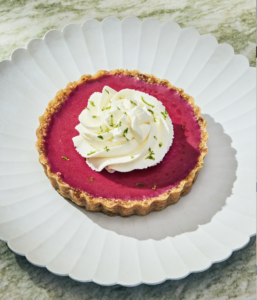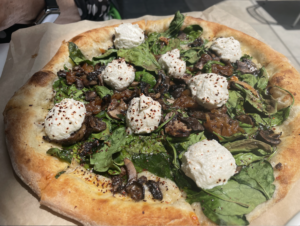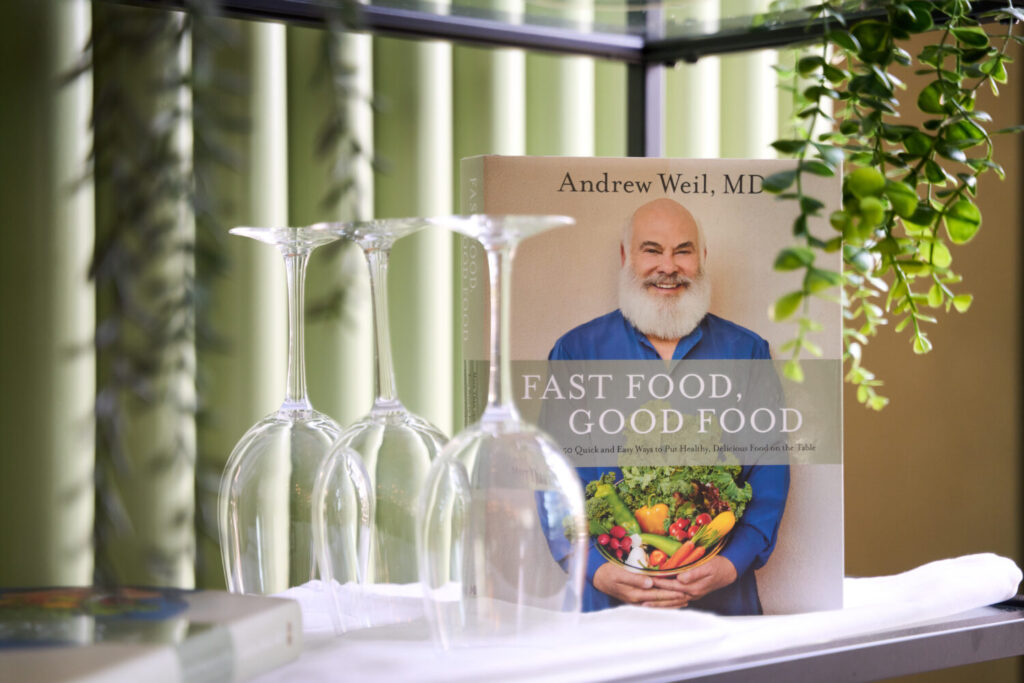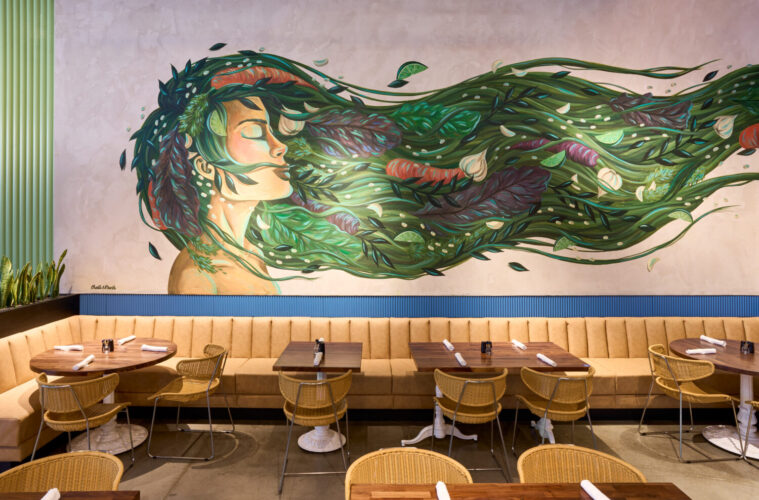Founded by integrative medicine specialist and creator of the anti-inflammatory food pyramid, Dr. Andrew Weil, True Food Kitchen opens its 44th location this week at the Westfield Century City mall. The chain celebrates 15 years with an expansive, wrap-around indoor/outdoor dining patio and the brand’s first location to feature a stand-alone island bar with a colorful and juicy cocktail program.
Once considered a little quirky and avant-garde with his ideas of treating food as medicine back in the ‘70s and ’80s before anyone was throwing around words like gluten-free, vertical farming or food sustainability, Dr. Weil’s philosophy has become this generation’s mantra. The pioneer of how we view food and the future of how we eat was on hand to celebrate the opening.
“One of my motivations in starting this was that there weren’t a lot of places that I could eat out at with foods that met my nutritional needs,” the razor-sharp 81-year-old pescatarian who is the Clinical Professor of Medicine at The University of Arizona told L.A. Weekly at the opening this week.

Pink key lime tart with ube (Ryan Tanaka)
“I’m constantly changing my eating patterns based on what I’ve learned,” says the Harvard Medical School grad who has authored numerous books including From Chocolate to Morphine: Everything you need to know about mind-altering drugs with Winifred Rosen . “I think the whole sustainability issue was never really discussed not that long ago, and the impact of food choices on climate change and the environment is of great concern. I keep seeing all these crazy diets that people are following here in America like the keto and paleo diets in their extreme forms. I think excluding food like grains and beans just doesn’t make sense to me. Beans are cheap and great sources of protein and fiber and slow-digesting carbohydrates.”
When Weil opened his first restaurant in Arizona, he wanted it to be a plant-based menu but also wanted to provide something for everyone so that carnivores could have healthy choices, too.
The new location tapped the husband-and-wife artist team behind Chalk and Brush to create an indoor, floor-to-ceiling mural of the restaurant’s signature “Green Goddess,” symbolizing joy and natural wholesome nourishment. The artists painted an outdoor installation featuring colorful layers of foliage along the restaurant’s exterior, which serves as the patio’s focal point, along with a living succulent wall. The open floor plan concept showcases a stand-alone island bar positioned at the center of the restaurant lit with hanging LED pendant lights, a nod to Century City’s modern, metropolitan lamp posts, along with full-length accordion glass doors that transition the dining room to the outdoor patio, with seating for 139 indoors and 142 al fresco.

Spinach and mushroom pizza with lemon almond ricotta (Michele Stueven)
Weil, who eats a varied diet and starts the day off with a smoked salmon bagel and bowl of blueberries for breakfast, and crustless quiche for lunch, gave us some of his do’s and don’ts on diet:
“It’s good to have mushrooms in the diet and we’re lucky now because so many different kinds are available. They have medicinal effects that enhance immunity and some like lion’s mane that stimulate memory. It’s very good to eat greens like kale, brussel sprouts and the entire cabbage family, and across the color spectrum every day. Those pigments have protective qualities. It’s good to eat nuts and seeds, which during the low-fat era people were told to avoid.
“We have a lot of centenarians around now to study, which we didn’t have before, and they’re all over the map. Keep animal foods low. You don’t have to completely avoid them. Alcohol: I continue to think that moderate use of alcohol is OK, but the main advice that I give to people is give yourself two or three alcohol-free days a week. You see that younger people are really into mocktails and trending away from alcohol,” said Weil.
“Avoid things like margarine and vegetable shortenings and the whole category of processed foods that you find in the middle of the supermarket. Cut out artificial sweeteners, which do awful things to the gut microbiomes. Over time, they increase your cravings for sugar. Look at the labels. If you were going to make this at home, what would you put in it? If there are more things than what you would use that you don’t recognize, put it back on the shelf.

“Good things are the entire cabbage family and oily fish. I’m very concerned about the sustainability of the fish we eat, so I’m a really big fan of sardines, herring and kippers. They’re pretty sustainable, at least for the moment. I like the smoked kipper snacks, which I’ll mash up with mustard, chopped onion and lemon and put it on a rye cracker or lettuce leaf. It’s a great cheap healthy lunch. I’m also a great believer in whole soy foods. The earlier in life those are introduced, the more protection you get later and chances for longevity,” continued Weil.
“Sugar vs saturated fat: Our views on saturated fat have really changed. We used to think that was ultimately bad food and now there are questions raised if it’s really the main driver of cholesterol. There are different types of saturated fat. One of the worst is beef fat and one of the better categories is high quality dairy fat like cheese and yogurt, which can be good for the heart. I don’t tell people not to eat sugar. It’s good to keep your intake low and watch how much fructose you’re taking in. It deranges liver metabolism. Different sweeteners have different amounts – table sugar isn’t that bad. Agave, which was promoted as being so healthy, is 85% fructose. The one that’s the lowest is maple syrup at 35%. Honey is high fructose. Not all sugar is equal. The first step is to stop drinking sweetened liquids. And it’s not just soda, it’s fruit juice and energy drinks, coffee and tea.”
Advertising disclosure: We may receive compensation for some of the links in our stories. Thank you for supporting LA Weekly and our advertisers.

